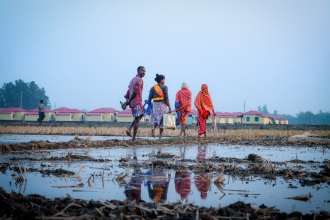
EfD Tanzania kicked off the Inclusive Green Program with the participants
The participants in the Inclusive Green Economy Program (IGE) in practice program, the IGE fellows, met the senior researchers and the support team to discuss and forge a common understanding of the…
Efficiently reducing pollution from the seafood industry requires differentiated environmental fees
The seafood processing industry plays a vital role in job creation and economic growth, particularly in regions like the Mekong River Delta of Vietnam. However, this industry also generates a significant amount of organic pollutants, predominantly discharged into riverside and seashore areas.
Harnessing solar and wind for sustainable cross-border electricity trade in the Greater Mekong Subregion
Sustainable, low-emission electricity generation options are needed in the Greater Mekong Subregion, including for cross-border electricity trade. Large-scale investment in solar and wind power, together with off-river pumped hydro energy storage, is identified as a promising way forward. The GMS has many potential off-river pumped hydro sites. Actionable recommendations include greater use of bilateral power purchase agreements for cross-border solar and wind power supply, and potential development of a high-voltage direct current grid.
Phasing out coal power in a developing country context: Insights from Vietnam
At the United Nations Framework Convention on Climate Change 26th Conference of the Parties (COP 26) in November 2021, Vietnam pledged to phase out unabated coal power by the 2040s or as soon as possible thereafter. Achieving this will require major efforts.
Water value, irrigation policy, and implementation hazards in Vietnam’s rural economy
Irrigation plays a critical role in Vietnam’s rural economy and the national food security priority. The Vietnamese government has developed an extensive irrigation system and waived irrigation costs for farmers to reduce rural poverty. However, excessive use of water in agriculture has become a major concern.
Scuba divers, coral reefs, and knowledge of ocean acidification
Ocean acidification (OA) poses a threat to coral reefs by increasing the fragility of susceptible corals to physical damage. As such, the impacts of dive tourism are likely to be exacerbated under acidified conditions. While evidence exists on the impacts of OA, research is scant on scuba divers’ knowledge of OA.
Inflation-related tax distortions in business valuation models: A clarification
The current corporate income tax (CIT) expense occupies just one line item on the statement of profit or loss and other comprehensive income. However, it is a unique line item following tax rules and not financial reporting rules.
Consumers’ willingness to pay an environmental fee for e-waste recycling in Vietnam: integrating the theory of planned behaviour and the norm activation model
E-waste is becoming a concern due to its toxic content and serious pollution effect. Many studies have focused on the detrimental impacts of hazardous e-waste and extended producer responsibility for e-waste recycling. There is, however, a lack of case studies from the perspectives of consumers’ awareness of e-waste, and willingness to pay (WTP) for e-waste recycling. An e-waste management system cannot be efficient when consumers are not actively involved in.
Effects of climate shocks on sectoral inequality
Over the last three decades, agricultural and industrial sector workers have suffered consumption losses due to temperature rise while those in the services sector saw consumption increases. This article discusses the broad range of impacts of climate change across sectors and highlights the stark rise in inequality of household consumption due to increased temperature variability. It emphasises the need for social protection schemes, and data on the economic impacts of climate change to aid the design of adaptation policies.
Pagination
- Previous page
- Page 27
- Next page

